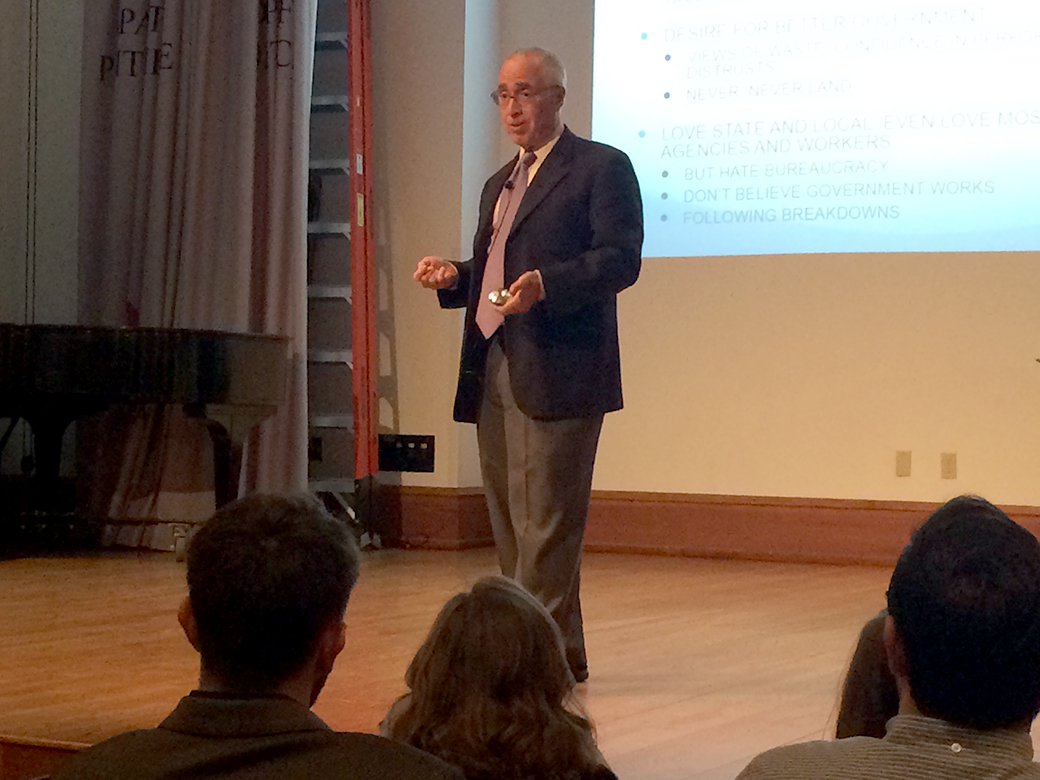
Farber Lecture sheds light on elections, legacy of Doc Farber
The 2016 elections, while still a year away, were at the forefront of this year’s University of South Dakota Farber Fund Lecture.
Presenting this year’s lecture was Paul Light, a professor of public service at New York University. The lecture was held March 19th in Farber Hall and was hosted by the Political Science League (PSL).
Light’s hour-long lecture focused on the role of governmental reform and voter shift in shaping the outcome of the 2016 presidential election. Light, who grew up in Sioux Falls, also made a prediction that it was possible for Rand Paul to win.
Senior Chad Peterson, president of the PSL, opened the lecture before handing the mic to Light, who spoke briefly about Farber’s legacy.
“A lot of great political scientists came out of USD,” Light said. “Farber was a great professor. A lot of what’s good about the government of South Dakota can be traced back to Doc Farber and his work here, so it’s really an honor for me to be here.”
Light’s election research centers on the division of voters based on their trust of the federal government. He also divided the voter population into four groups of government reform: dismantlers, streamliners, priority-setters and reinventors. Light used these divisions to analyze the way elections play out.
Light said it was possible for Rand Paul to win the presidency, though he considered this prediction to still be murky.
“He’s a very unusual, very unpredictable candidate,” Light said. “I’d take Kentucky against the entire field for a dollar.”
The lecture was followed up by a Q&A session, in which audience members, such as South Dakota House of Representatives member Ray Ring, asked Light questions pertaining to his research and his other thoughts on the upcoming election – including some speculation about the current situation with Hillary Clinton, who was caught using her personal email at the Capitol.
First-year Jordan Hanson, a political science major, said she was impressed by the lecture’s depth.
“I was actually delightfully surprised,” Hanson said. “He brought forth a lot of points that I just had not thought about, or even if I had thought about (them), he brought them forth in a different way.”
Senior Sam Reuland, vice president of PSL, said while choosing a speaker, the group wanted to offer listeners a more nonpartisan angle on politics with the lecture.
“We solicited names from the faculty,” Reuland said. “They came up with a list of scholarly individuals who were not really on the far left or far right. They were people who could come in, they could give a good lecture on today’s topic.”
Reuland said one of the points of the lecture is to keep students informed about their government.
“We want to have informed voters,” Reuland said. “We want to have people who will make the correct choices in their minds so that we can have a better-run country.”
Peterson wants students to realize their view of politics should not be obscured by partisanship.
“We’re really about the academia side of politics and the non-partisan approach,” Peterson said. “So take a step back from the partisan lens and see what else is going on in politics. It’s beyond elections and beyond the face value of politics, and kind of dig deeper into the better looking, inner workings of politics.”
(Photo: Paul Light, professor of public service at New York University, delivered a lecture March 19 in Farber Hall about how governmental reform would impact the upcoming 2016 election. Megan Street / The Volante)


